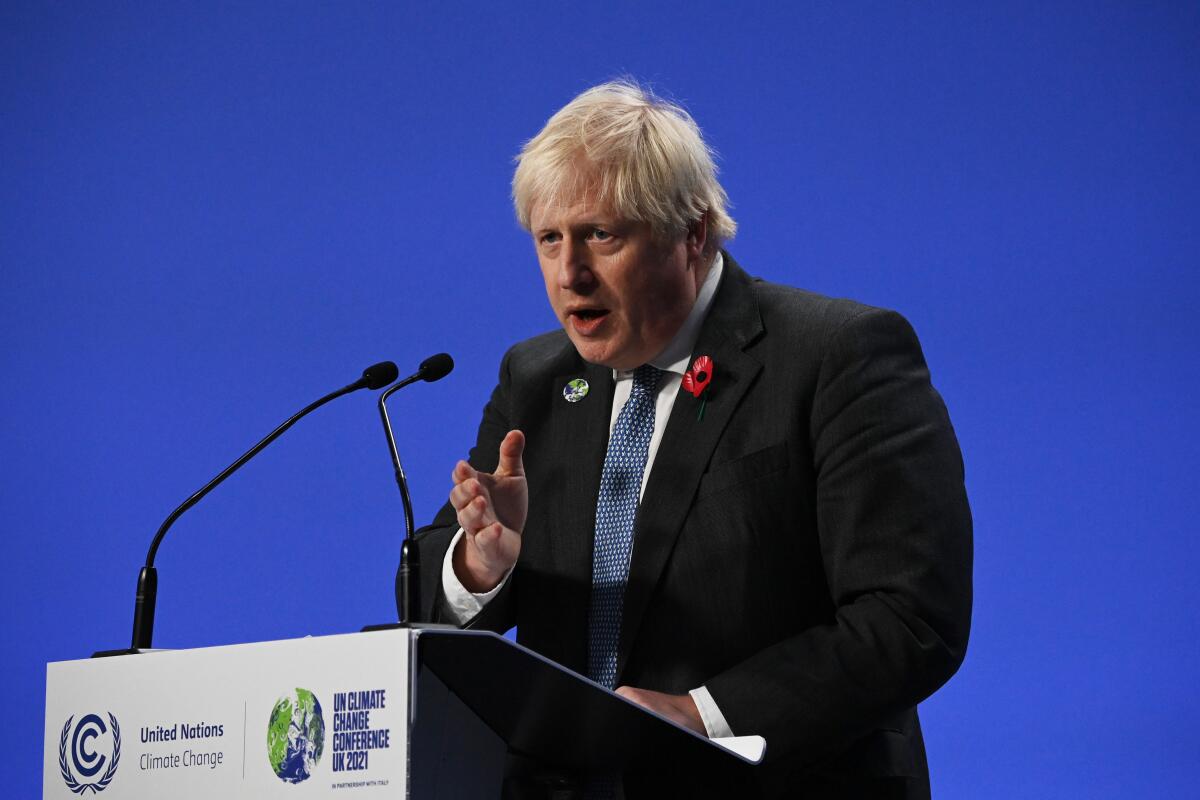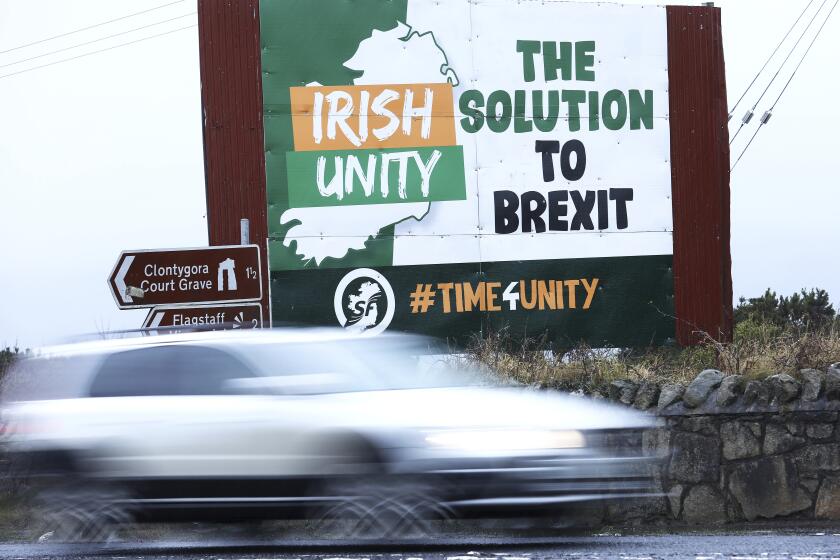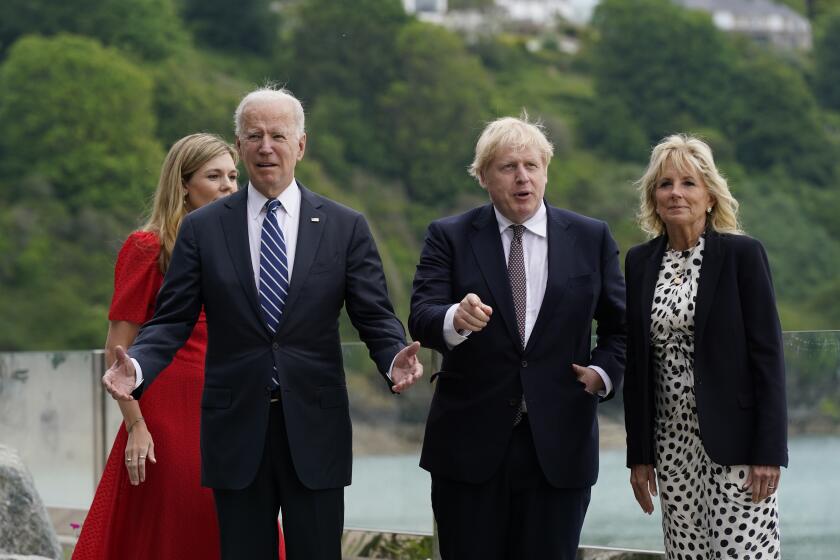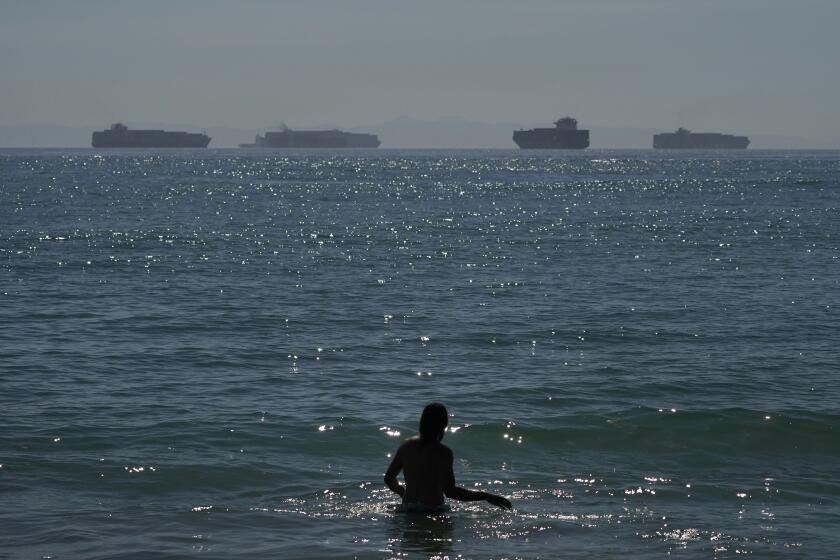U.N. climate summit offers Boris Johnson a turn in the spotlight — with plenty of room for gaffes

- Share via
LONDON — By the time British Prime Minister Boris Johnson traveled to the big U.N. climate-change conference in Glasgow on Wednesday, making his second appearance at the gathering, he’d internalized an important lesson: He pointedly arrived at the Scottish venue by train, rather than traveling by jet.
The irrepressible Johnson has sought to parlay his role as summit host into a high-profile turn in the world spotlight. And he has garnered some favorable reviews for his passionate pleas to world leaders to make sweeping planet-saving pledges during the conference known as COP26, which ends Friday.
But in classic Johnsonian style, the 57-year-old prime minister has also had his share of gaffes along the way — including a trip home to London last week by chartered plane after a speech marking the conference opening. News accounts swiftly emerged that he had hurried back for a reunion that evening of old friends at a posh private club.
Adding to Johnson’s woes has been a political scandal that has largely overlapped with the two-week climate gathering. The controversy, involving payments in contravention of lobbying rules to a lawmaker from Johnson’s Conservative Party, has generated numerous unflattering newspaper headlines, many featuring variants on the word “sleaze.”
“I genuinely believe that the U.K. is not remotely a corrupt country, nor do I believe that our institutions are corrupt,” he told reporters in Glasgow on Wednesday when asked about the contretemps.
Scandals are hardly a rarity in British political circles, but this one came just as Johnson — who enjoys drawing parallels between himself and the country’s iconic World War II leader, Winston Churchill — had hoped to appear at his most statesmanlike before a world audience. The lawmaker in question, Owen Paterson, resigned, but not before Johnson was excoriated for seeking to shield him from accountability.
The world’s top two carbon polluters, China and the United States, have pledged to increase cooperation on climate action in a joint declaration at U.N. climate talks in Glasgow.
Before the Glasgow gathering, Johnson was eager to telegraph that Britain remains a world power despite Brexit, its messy divorce from the European Union, and to demonstrate that the country is beginning to bounce back from the devastation of the pandemic.
“We’re going to use Brexit freedoms to do things differently,” he said during a party conference last month, where he touted a newly energized “global Britain” and his own “can-do government” as a model for others.
“People around the world admire this country for its history and traditions,” he said.
But it’s been a season of setbacks. Coronavirus infections are again at worrying levels, and many Britons were angered and disheartened last month when panic buying, driver shortages and supply-chain issues led to long lines and empty gas pumps, forcing the government to bring in military personnel to help haul fuel.
The pandemic’s toll and anger over Brexit in Scotland and Northern Ireland are fueling warnings that the United Kingdom could be headed for a breakup.
“Going into the winter will be a challenge,” said Joseph Silke, the communications manager at the independent think tank Bright Blue. “There is a fuel crisis; COVID is getting worse.”
Although Johnson has little real say over the climate conference outcome, a draft accord circulated by the U.N. climate agency was being criticized Wednesday for not going far enough to try to stem greenhouse gas emissions. The working draft calls on signatories to aim to phase out use of coal and halt subsidies for oil and gas, but contains little in the way of hard deadlines or mechanisms for enforcing pledges made.
Prior to the gathering, the prime minister had made no secret of the fact that he hoped Glasgow would become a watchword for the world resolutely coming together to slow climate change — and carrying prestige commensurate with that of the Paris climate conference six years earlier.
“This country will host the summit of our generation in Glasgow, when the resolve of the world is put to the test,” he told Conservative Party faithful.
Biden meets with Johnson ahead of the G-7 summit in Cornwall, England. They’ve differed on Brexit, Northern Ireland and Donald Trump.
Regardless of whether the conference in Scotland is seen as a landmark effort to confront a grave environmental threat, analysts and even some political critics said Johnson deserved credit for propelling Britain to a leadership role on climate change.
“Net zero is obviously a passion of the prime minister’s,” said Mike Brewer of the Resolution Foundation, an economics think tank, referring to striking a balance between greenhouse gases produced and removed from the atmosphere.
For many, though, the conference has been a reminder of Johnson’s polarizing political style.
At even the most wrenching national moments, the prime minister sometimes struggles to summon a sense of gravitas. But his inaugural remarks to the Glasgow conference demonstrated genuine clarity of purpose, said Bronwen Maddox, director of the Institute for Government, an independent think tank.
Breaking News
Get breaking news, investigations, analysis and more signature journalism from the Los Angeles Times in your inbox.
You may occasionally receive promotional content from the Los Angeles Times.
His speech “was really clear cut, it wasn’t fudging — it was saying: ‘The world is running out of time,’” Maddox said. “And given that he’s such an optimist, for him to come out with such an alarming speech — I’m not saying alarmist, but such an alarming warning to the world — was very striking.”
“The clock is ticking,” the prime minister somberly told the gathering, citing the “invisible and suffocating blanket of CO2” engulfing the planet.
But as so often happens with Johnson, behavior lauded as appropriately serious is quickly eclipsed by some pratfall. At the conference that same day, news photos showed him appearing to flout coronavirus rules by sitting unmasked next to famed environmentalist and broadcaster David Attenborough, who is 95 and considered a national treasure.
The prime minister’s defenders pointed to other pictures taken around the same time that showed him masked up, or Attenborough without one, but Johnson did himself no favors with a subsequent flailing CNN interview in which he seemed to suggest that he didn’t feel the need to wear a mask around people with whom he was socially acquainted.
The agreement reflects a growing recognition that the shipping industry isn’t doing enough to curb emissions on its own.
Longtime observers of Johnson’s political trajectory expressed a degree of skepticism about whether a populist leader like him would stick to strict climate-change measures if he perceived an actual threat to his popularity.
For example, said Johnson biographer Andrew Gimson, the prime minister has told Britons there will have to be major changes in patterns of home energy consumption — but he also wrote a column for a tabloid newspaper offering cheery assurances that the “boiler police” wouldn’t come knocking to check up on whether people were using energy-inefficient hot-water heaters.
“That was a piece of ‘cakeism’ — you can have your cake, and eat it too,” Gimson said. “You can have your planet, and also have a nice warm house.”
Special correspondent Boyle reported from London and staff writer King from Washington.
More to Read
Sign up for Essential California
The most important California stories and recommendations in your inbox every morning.
You may occasionally receive promotional content from the Los Angeles Times.














